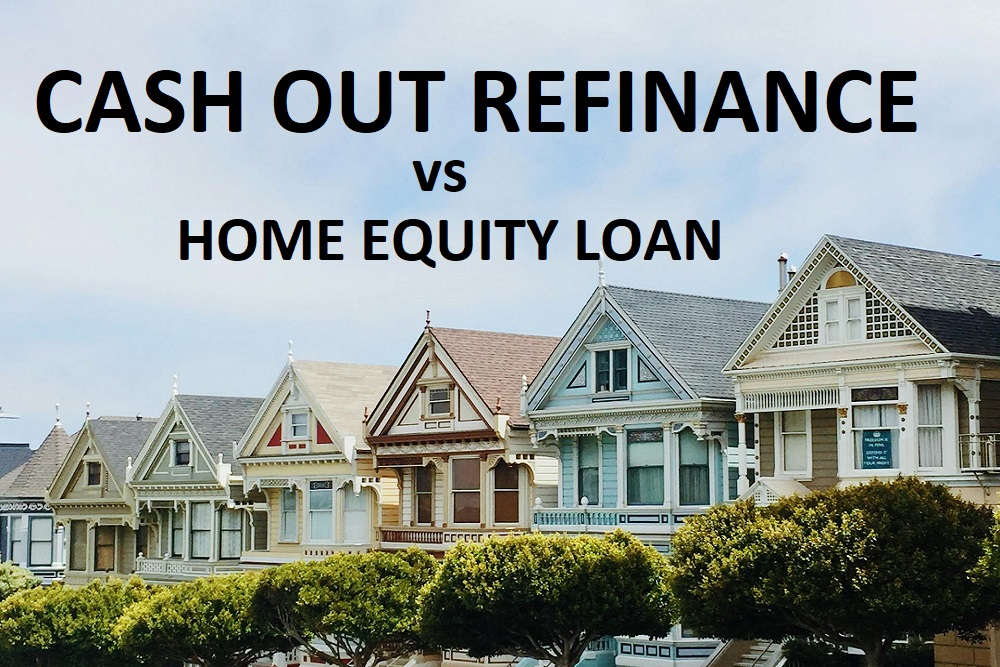Cash-Out Refinance vs. Home Equity Loan: Which Is Right for You?
Cash-Out Refinance vs. Home Equity Loan: Which Is Right for You?

Homeownership comes with a unique financial advantage: the ability to tap into your home’s equity to fund major expenses, consolidate debt, or invest in new opportunities. Two popular ways to access this equity are through a cash-out refinance or a home equity loan. But which option is best for your financial situation? In this article, we’ll break down the differences, benefits, and drawbacks of each to help you make an informed decision.
What Is Home Equity?
Before diving into the specifics of cash-out refinancing and home equity loans, let’s clarify what home equity is. Home equity is the portion of your home’s value that you own outright, calculated as the difference between your home’s current market value and the remaining balance on your mortgage. For example, if your home is worth $400,000 and you owe $200,000 on your mortgage, you have $200,000 in equity.
Equity builds over time as you pay down your mortgage and as your home’s value appreciates. Accessing this equity can provide a low-cost source of funds, but it’s important to understand the tools available and their implications. For instance, another option to consider is a Home Equity Line of Credit (HELOC), which offers flexible access to funds compared to a lump-sum loan.
What Is a Cash-Out Refinance?

A cash-out refinance involves replacing your existing mortgage with a new, larger mortgage and receiving the difference in cash. For example, if you owe $200,000 on your current mortgage and refinance with a new $300,000 mortgage, you’d receive $100,000 in cash (minus closing costs and fees).
Here’s how it works:
- You apply for a new mortgage that exceeds the balance of your current loan.
- The new mortgage pays off your existing mortgage, and you receive the remaining funds as a lump sum.
- The new mortgage comes with its own interest rate, term (e.g., 15 or 30 years), and monthly payments.
Cash-out refinances are often used for home improvements, debt consolidation, or major purchases like a second home or college tuition. To understand the process in detail, check out how a cash-out refinance works.
Pros of a Cash-Out Refinance
- Potentially lower interest rates: Since a cash-out refinance is a first mortgage, it often comes with lower interest rates compared to home equity loans or other forms of credit.
- Single monthly payment: You’ll have one mortgage payment instead of managing multiple loans.
- Opportunity to reset terms: You can choose a new loan term or switch from an adjustable-rate mortgage (ARM) to a fixed-rate mortgage for more predictability.
- Tax benefits: Interest on a cash-out refinance may be tax-deductible if the funds are used for home improvements, though you should consult a tax professional.
Cons of a Cash-Out Refinance
- Higher closing costs: Refinancing typically involves closing costs of 2% to 5% of the loan amount, which can be substantial.
- Longer loan term: Extending your mortgage term could mean paying more interest over time, even if your monthly payments are lower.
- Risk of foreclosure: Since your home secures the loan, failure to make payments could result in losing your home.
- Market dependency: You’ll need sufficient home equity, which depends on your home’s appraised value. Learn more about the maximum cash-out refinance amount possible.
What Is a Home Equity Loan?

A home equity loan, sometimes called a second mortgage, allows you to borrow against your home’s equity while keeping your existing mortgage intact. You receive the loan as a lump sum and repay it over a fixed term, typically 5 to 20 years, with a fixed interest rate.
Here’s how it works:
- You borrow a specific amount based on your available equity, typically up to 80% to 90% of your home’s value minus your mortgage balance.
- The loan is repaid in fixed monthly installments, separate from your primary mortgage payment.
- Like a cash-out refinance, the loan is secured by your home, meaning it carries the risk of foreclosure if you default.
Home equity loans are often used for similar purposes as cash-out refinances, such as home renovations, medical expenses, or consolidating high-interest debt.
Pros of a Home Equity Loan
- Fixed interest rates: Home equity loans typically have fixed rates, providing predictable monthly payments.
- Lower upfront costs: Closing costs for home equity loans are generally lower than those for a cash-out refinance.
- Preserves existing mortgage: If you have a low interest rate on your current mortgage, you can keep it and borrow separately.
- Flexible use of funds: You can use the money for virtually any purpose, from home improvements to debt consolidation. Explore top reasons to consider cash-out refinancing for similar use cases.
Cons of a Home Equity Loan
- Higher interest rates: As a second mortgage, home equity loans often have higher rates than first mortgages like a cash-out refinance.
- Additional monthly payment: You’ll need to manage two mortgage payments, which could strain your budget.
- Risk of foreclosure: Like any loan secured by your home, defaulting could lead to losing your property.
- Equity reduction: Borrowing against your equity reduces the cushion you have in case home values decline.
Key Differences Between Cash-Out Refinance and Home Equity Loan

While both options allow you to access your home’s equity, they differ in structure, cost, and impact on your finances. Here’s a quick comparison:
- Loan structure: A cash-out refinance replaces your existing mortgage, while a home equity loan is a separate loan.
- Interest rates: Cash-out refinances typically have lower rates, but home equity loans offer fixed rates for predictability.
- Closing costs: Cash-out refinances have higher closing costs, while home equity loans are generally cheaper to initiate.
- Repayment: A cash-out refinance consolidates payments into one, while a home equity loan adds a second payment.
- Impact on mortgage: A cash-out refinance resets your mortgage terms, while a home equity loan leaves your primary mortgage unchanged.
Which Option Is Right for You?
Choosing between a cash-out refinance and a home equity loan depends on your financial goals, current mortgage terms, and overall financial health. Here are some scenarios to guide your decision:
Choose a Cash-Out Refinance If:
- You want to lower your mortgage interest rate or change your loan terms.
- You need a large sum of money and prefer a single monthly payment.
- You’re comfortable with higher upfront costs for potentially lower long-term interest rates.
- You have significant equity and your home’s value is stable or increasing.
Choose a Home Equity Loan If:
- You have a low interest rate on your current mortgage and want to keep it.
- You need a smaller loan amount and prefer lower closing costs.
- You want predictable payments with a fixed interest rate.
- You’re comfortable managing two separate loan payments.
Other Considerations
Before deciding, evaluate the following:
- Your credit score: Both options require good credit, but cash-out refinances may have stricter requirements.
- Debt-to-income ratio: Lenders will assess your ability to manage new payments based on your income and existing debts.
- Future plans: If you plan to sell your home soon, a home equity loan’s shorter term may be more practical.
- Market conditions: If interest rates are high, a home equity loan might be more affordable than refinancing your entire mortgage.
Tips for Making the Most of Your Home Equity

Whether you choose a cash-out refinance or a home equity loan, use the funds wisely to maximize their value:
- Prioritize high-return investments: Use the money for home improvements that increase your property’s value or for consolidating high-interest debt.
- Avoid overspending: Borrowing against your home is not free money—ensure you can afford the new payments.
- Shop around: Compare rates, fees, and terms from multiple lenders to get the best deal.
- Consult a professional: A financial advisor or mortgage broker can help you weigh the pros and cons based on your unique situation.
Conclusion
Both cash-out refinances and home equity loans offer valuable ways to tap into your home’s equity, but they come with different costs, risks, and benefits. A cash-out refinance may be ideal if you want to consolidate debt or reset your mortgage terms, while a home equity loan is better suited for those who want to preserve their existing mortgage and borrow a smaller amount. By carefully assessing your financial goals, current mortgage, and market conditions, you can choose the option that best aligns with your needs.
Take the time to explore your options, compare lenders, and consider the long-term impact on your finances. Your home is one of your most valuable assets—make sure you’re using its equity wisely.